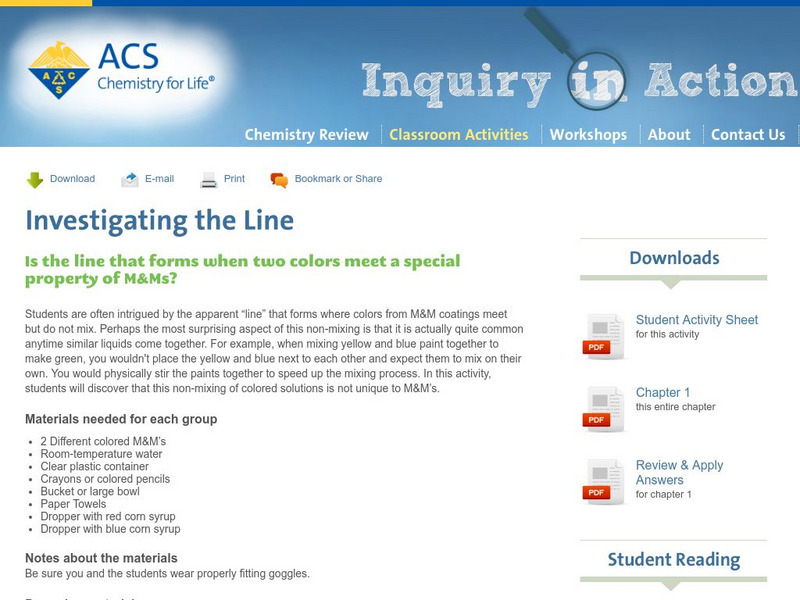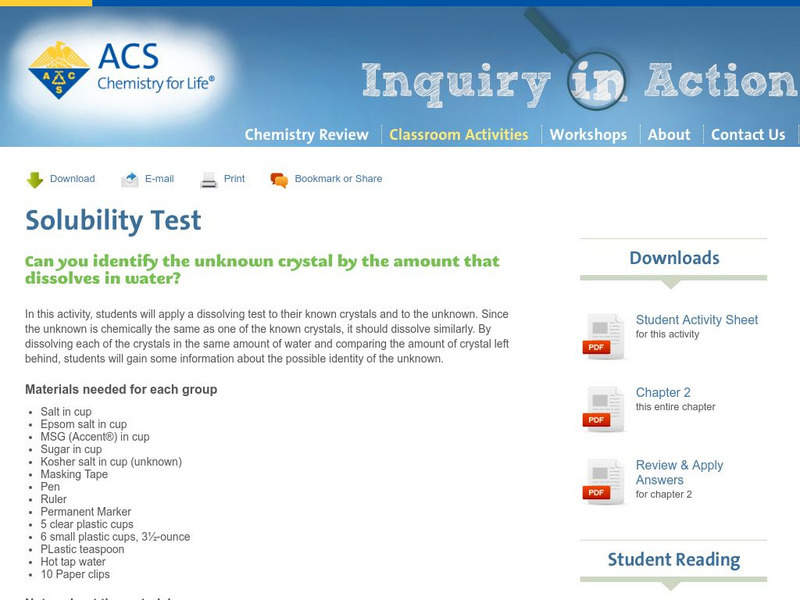American Chemical Society
Middle School Chemistry: Lesson Plans: What Is a Chemical Reaction?
After observing a demonstration of a chemical reaction between a burning candle and the oxygen in the air, learners use atom model cut-outs to model the reaction and see that all the atoms in the reactants show up in the products.
American Chemical Society
Middle School Chemistry: Heat, Temperature, and Conduction
Students observe, describe, and draw a model on the molecular level, showing how energy is transferred from one substance to another through conduction.
American Chemical Society
Inquiry in Action: Curious Crystals
Students compare unknown crystals to known crystals to try to identify the unknown in this lab experiment. Lab experiment includes student and teacher instructions.
American Chemical Society
Inquiry in Action: Crushing Test
This lab activity will have students crushing crystals to learn about variables and the importance of controlling those variables. Lab activity includes student and teacher instructions.
American Chemical Society
Inquiry in Action: Recrystallization Test
In this activity, students will identify an unknown crystal based on its appearance when it recrystallizes. Activity includes both student and teacher instructions.
American Chemical Society
Inquiry in Action: Tests to Distinguish Between Similar Looking Liquids
Using the properties of liquids, students will identify unknown liquids by seeing how they behave on different paper surfaces. This site includes teacher and student instructions for the lab activity.
American Chemical Society
American Chemical Society: Chemical & Engineering News: Reel Science
Reel Science publishes reviews of movies with a science or science fiction theme. Its aim is to heighten awareness of inaccuracies in the ways science is presented in film, and to promote greater public understanding of true science.
American Chemical Society
Middle School Chemistry: Heat, Temperature, and Conduction
Explore heat, temperature, and the conduction of thermal energy through different materials.
American Chemical Society
Middle School Chemistry: Represent Bonding With Lewis Dot Diagrams
Students draw and interpret Lewis dot diagrams for individual atoms and both covalent and ionic compounds.
American Chemical Society
Middle School Chemistry: Protons, Neutrons, and Electrons
Investigate why a charged object is attracted or repelled by another charged object. Explore the concept that the attraction between positive protons and negative electrons holds an atom together.
American Chemical Society
Middle School Chemistry: Moving Molecules in a Solid
Learners observe and describe, on the molecular level, how heating and cooling affect the motion of molecules in a solid.
American Chemical Society
Middle School Chemistry: Molecules in Motion
Students observe, on a molecular level, how heating and cooling affect molecular motion.
American Chemical Society
Middle School Chemistry: Energy Changes in Chemical Reactions
Students will conduct two chemical reactions: endothermic and exothermic. They will see an animation that shows that it takes energy to break bonds and that energy is released when new bonds are formed, and use that animation to explain...
American Chemical Society
Middle School Chemistry: Chemical Reactions & Engineering Design
This lesson begins with a story about rescuing reptile eggs from a new construction site. Using the story as motivation, students are presented with an engineering design challenge: Build a portable device which can warm, support, and...
American Chemical Society
Middle School Chemistry: Chapter 4: The Periodic Table and Bonding
Six middle school chemistry lessons about the periodic table and bonding complete with handouts and animations.
American Chemical Society
Middle School Chemistry: The Ups and Downs of Thermometers
Based on experimental observations, students describe, on the molecular level, why the liquid in a thermometer goes up when it is heated and down when it is cooled.
American Chemical Society
Middle School Chemistry: Energy Levels, Electrons, and Covalent Bonding
Students discover the concept that two atoms can attract and form a covalent bond.
American Chemical Society
Middle School Chemistry: Heating and Cooling a Liquid
This simulation allows students to make observations about how particle motion changes as the overall temperature of a liquid changes.
American Chemical Society
American Chemical Society: Green Chemistry Educational Resources
A collection of teaching resources that are based on environmentally conscious chemistry principles, otherwise known as 'green chemistry.' Includes a list of recommended books, websites with additional resources, and a collection of...
American Chemical Society
Inquiry in Action: Investigating the Line
Students will observe the non-mixing of colored solutions by using M&M's in this lab activity. Lab activity includes both student and teacher instruction sheets.
American Chemical Society
Inquiry in Action: M&m in Different Temperatures
An activity where students experiment with the effect of temperature on how fast the colored coating dissolves on M&M's. Activity includes student and teacher instructions.
American Chemical Society
Inquiry in Action: M&m's in Different Sugar Solutions
An activity to investigate the factors that affect the rate of a substance dissolving. In this activity, students see if the rate of dissolving of the M&M coat is changed by the amount of sugar already dissolved in water. This...
American Chemical Society
Inquiry in Action: Solubility Test
A lab activity where students will identify an unknown crystal by applying a dissolving test.
American Chemical Society
Inquiry in Action: Look Alike Liquids
Students will learn to identify four unknown colorless liquids based on their characteristic properties in this activity. The lab activity includes both teacher and student instructions.











